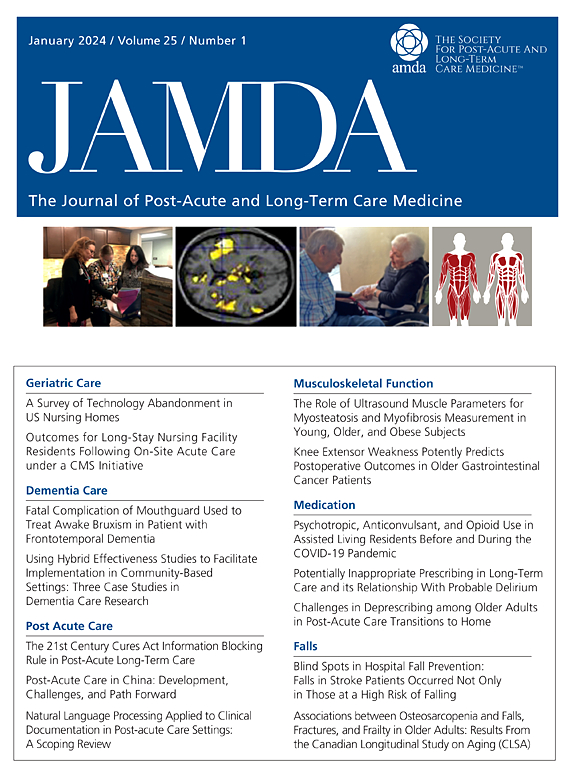A Nursing Home Clinician Survey to Explain Gabapentinoid Increases
IF 4.2
2区 医学
Q2 GERIATRICS & GERONTOLOGY
Journal of the American Medical Directors Association
Pub Date : 2024-11-17
DOI:10.1016/j.jamda.2024.105363
引用次数: 0
Abstract
Objectives
Survey nursing home (NH) clinicians about the indications for NH gabapentinoid use, the factors driving increased prescribing, and their experiences with gabapentinoid deprescribing.
Design
Online clinician survey.
Setting and Participants
NH clinicians prescribing gabapentinoids in US NHs.
Methods
An anonymous survey of NH prescribers was conducted using SurveyMonkey from March 15 to July 1, 2024. Recruitment employed crowdsourcing, targeting the membership of NH clinician organizations. A multidisciplinary team developed the instrument. Content focused on the magnitude of gabapentinoid prescribing for different, previously identified, indications, as well as clinician deprescribing experiences and perspectives.
Results
Sixty-two self-identified NH prescribers participated: 76% white, 55% female, 77% physicians. One-third had geriatric training certifications. Most NH gabapentinoids were started in other care settings by non-NH clinicians. Gabapentinoid prescribing initiated in NHs was principally off-label for pain syndromes. Although prescribing solely for psycho-behavioral symptoms was rare, most clinicians reported that gabapentinoids have some utility in treating these symptoms and consequently may be preferred over alternative analgesics when psycho-behavioral symptoms coexist with pain. Gabapentinoid deprescribing occurs infrequently and is deprioritized relative to opioid reduction efforts. Most clinicians acknowledged potential gabapentinoid side effects; however, severe harms were rarely observed, and half agreed that gabapentinoids are generally safe and well-tolerated. Seventy-nine percent perceive gabapentinoids as safer and better tolerated than opioids, 57% than benzodiazepines, and 40% than antipsychotics.
Conclusions and Implications
An opportunity exists to increase NH safety by prioritizing gabapentinoid gradual dose reduction requirements. Because so many prescriptions originate outside NHs, any reduction effort should emphasize deprescribing across all care settings. Clinicians’ perceptions of gabapentinoids as reasonable but unmonitored alternatives to opioids and psychotropics contribute to their increased use. Safety and efficacy data supporting such prescribing for nonapproved indications in NHs is lacking. Existing NH psychotropic reporting and reduction mandates should include gabapentinoids regardless of indication.
疗养院临床医生调查,解释加巴喷丁诺类药物增加的原因。
目标:调查疗养院(NH)临床医生使用加巴喷丁诺类药物的适应症、促使处方增加的因素以及他们取消加巴喷丁诺类药物处方的经验:调查疗养院(NH)临床医生对NH加巴喷丁诺类药物使用的适应症、促使处方增加的因素以及他们对加巴喷丁诺类药物停药的经验:设计:在线临床医生调查:环境和参与者:在美国国家卫生机构开具加巴喷丁类药物处方的国家卫生机构临床医生:从 2024 年 3 月 15 日至 7 月 1 日,使用 SurveyMonkey 对 NH 开处方者进行匿名调查。调查采用众包的方式,以北卡罗来纳州临床医生组织的成员为调查对象。一个多学科团队开发了该工具。内容主要涉及加巴喷丁诺类药物在不同适应症下的处方量,以及临床医生的去处方经验和观点:62名自我认定的新罕布什尔州处方者参与了调查:76%为白人,55%为女性,77%为医生。三分之一拥有老年医学培训证书。大多数新罕布什尔州的加巴喷丁诺类药物是由非新罕布什尔州临床医生在其他医疗机构开始使用的。非正规医疗机构开具的加巴喷丁诺类处方主要是针对疼痛综合征的非标签处方。虽然仅针对精神行为症状开具处方的情况很少见,但大多数临床医生表示,加巴喷丁类药物在治疗这些症状方面有一定作用,因此,当精神行为症状与疼痛并存时,加巴喷丁类药物可能比其他镇痛药更受青睐。减少加巴喷丁类镇痛药的情况并不常见,而且相对于减少阿片类药物的努力而言,加巴喷丁类镇痛药并不是优先事项。大多数临床医生承认加巴喷丁类药物有潜在的副作用,但很少观察到严重的危害,半数医生认为加巴喷丁类药物总体上安全且耐受性良好。79%的人认为加巴喷丁类药物比阿片类药物更安全且耐受性更好,57%的人认为比苯二氮卓类药物更安全且耐受性更好,40%的人认为比抗精神病药物更安全且耐受性更好:通过优先考虑加巴喷丁类药物逐渐减少剂量的要求,有机会提高国家卫生安全。由于许多处方来自非公立医院,因此任何减量工作都应强调在所有医疗机构中减少处方。临床医生认为加巴喷丁类药物是阿片类药物和精神药物的合理但不受监控的替代品,这也是导致其使用增加的原因之一。目前还缺乏支持在 NHs 中为未经批准的适应症开具此类处方的安全性和有效性数据。现有的国家卫生机构精神药物报告和减少任务应包括加巴喷丁类药物,无论其适应症如何。
本文章由计算机程序翻译,如有差异,请以英文原文为准。
求助全文
约1分钟内获得全文
求助全文
来源期刊
CiteScore
11.10
自引率
6.60%
发文量
472
审稿时长
44 days
期刊介绍:
JAMDA, the official journal of AMDA - The Society for Post-Acute and Long-Term Care Medicine, is a leading peer-reviewed publication that offers practical information and research geared towards healthcare professionals in the post-acute and long-term care fields. It is also a valuable resource for policy-makers, organizational leaders, educators, and advocates.
The journal provides essential information for various healthcare professionals such as medical directors, attending physicians, nurses, consultant pharmacists, geriatric psychiatrists, nurse practitioners, physician assistants, physical and occupational therapists, social workers, and others involved in providing, overseeing, and promoting quality

 求助内容:
求助内容: 应助结果提醒方式:
应助结果提醒方式:


